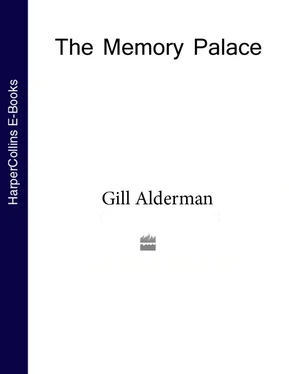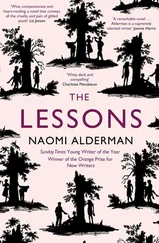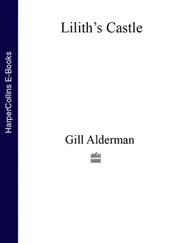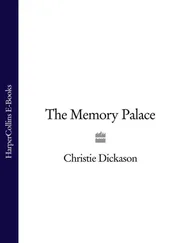One of the yellow stars shone out of the downstairs room at the Old Presbytery, the comfortable living-room in which he had left his son and Alice Tyler. The curtains had been drawn back, and the lamplight illuminated a stretch of gravel and his car. A second car, a big saloon, was parked beside it – Georges Dinard’s, he supposed. He heard Alice calling softly, ‘Guy! Guy?’ She was standing outside the open front door, her white shirt gleaming almost as much as her hair.
‘There you are! You missed dinner.’
He went swiftly up to her and put his arms round her. ‘I’m sorry,’ he said, ‘I’m always abandoning you. Where’s Dominic? Inside?’
‘He went to bed, ages ago. We are to sleep in that room.’ She pointed to a pair of open casements above the dining room into which he had peered in the afternoon; long ago in terms of new experiences: before he had met his son, before he had re-encountered Helen.
‘And Helen?’ he asked Alice. ‘Have you met her?’
‘Oh yes. She cooked for us and there was Bordeaux and a Pouilly Fumée. Georges came back from Lyon.’
They, he thought, are now in bed together. Jealousy crept up and snapped at his heels; he wanted to run into the house, upstairs, to throw the usurper out.
‘She left you some food,’ said Alice.
‘I’d rather go to bed!’
‘OK – this is the way.’ They walked, still joined in their embrace, up the staircase which turned near the top to repeat the layout of the wide passage below. The moonlight, he saw delightedly, had returned to light the passage and to coat Alice with its glamour. A crowd of statues stood elbow to elbow before him.
‘My God!’
‘They belong to Georges. Dominic showed me. There are others in the dining room,’ the girl said innocently. ‘Each one is connected with a death.’
‘That’s sick.’
‘Every artefact is connected with death, isn’t it? Everything passed on when someone dies.’
‘The gypsies burn all the possessions when one of them dies, even the sleeping-waggon.’
‘The vardo , yes. There’s a figure of the god Horus downstairs. Dominic told me it belonged to a man called Paon – who was guillotined for serial murder. In Lyon. In 1884–’
He touched the cold figure of a woodland nymph. ‘I know,’ he said. ‘I looked at your book in Avallon, while you slept. Strange to find something of Paon’s here.’
The whispered conversation, or the moonlight, was affecting him with a nervous agitation. He thought Alice relished her revelations too much, though her shoulder felt pleasantly warm under his hand.
‘Just coincidence,’ she said. ‘Come on.’
Their room had bare, polished boards and a wide bed, its white linen inviting. There were no curtains.
‘I’ll close the shutters,’ he said.
Alice caught his arm. ‘Leave them. I want to see you.’ She unbuttoned her shirt. ‘Look! Wouldn’t you prefer her?’
The soft finger of the moonlight reached right across the room and touched the statue of a second nymph, surely the sister of the first. Instead of wild fruits and leaves, this one wore a garland of kingcups and water lilies. The white marble she was carved from had been so highly polished it seemed as though her skin was wet, and they both went up to her and laid exploring fingertips upon her, Guy upon her left breast and Alice upon her right thigh.
‘Magic!’ he whispered. ‘She is you.’
‘No, she isn’t me; not now. She’s a nivasha – like you put in your books.’
‘You know,’ he turned away from the statue to Alice. ‘I don’t think I have ever described one. I imagine them much more deadly, sinister attenuated creatures.’
When he turned to look at the statue again it seemed dead and prosaic, a heavy piece of Victorian sentimentality standing guard over a cupboard door. In the moment of conversation with Alice he had glimpsed her moonlit body under her open shirt. He picked her up and laid her on the bed.
‘We are fortunate,’ he said. ‘Two nights of love under the moon. I want to see you in daylight too, at midday when the sun is hottest.’
‘In a hayfield – in an orchard in the shade of an old tree.’
But moonlight, he thought, best becomes her. He knelt over her. ‘Wait,’ she said and sat up to unfasten the ribbon which concealed the blemish on her neck. The mark looked darker, almost livid. He touched it.
‘It doesn’t spoil you,’ he said.
‘No. How could it? It is a mark of courage.’
‘I don’t understand.’
‘Because I survived hanging. They imprisoned and tortured me, they tore off my nails one by one. They strung me up on the gibbet outside the town gates, but I did not die – not for another sixty years. I hung till evening and when they cut me down, I had not died.’ Her voice rose triumphantly.
‘You are Alice Naylor,’ he whispered.
‘I am Alice Naylor, Roszi, and Alice Tyler.’
‘Roszi?’
‘Ah, Roszi.’ She gave no further explanation, but held his fingers against the scar on her neck. He could feel slight ridges and troughs, the negative cast of the twisted hemp.
‘Your survival of the hanging has rewarded you, given you a kind of eternity?’ he said but, no doctor or mortician accustomed to horrors, he shivered involuntarily. In the old days, such reverential touching was reserved for ghastly relics, feet of dead saints, dirty bones, crucified hands – which still took place in some holy fanes like Mediterranean churches, temples of the Far East; and this, the guest bedroom of Helen Lacey’s house in Coeurville, the town where he had lost his senses to this odd schoolgirl. She moved his hand away from her neck and held it between her breasts.
‘You understand, Guy Parados,’ she said, ‘because you are yourself abnormal, a storyteller obsessed by his inventions – so much so that you write them down and get them made into books which obsess others. Yes, I am Alice and Roszi and Alice again.’
‘My Roszi?’
‘Go to the top of the class, Mister Author! – but the real nivasha, not the paper one!’ She laughed, almost maliciously. ‘She lives in me alongside the others – just as you are both Guy Kester Parados and Christopher Guy Young.’
It was true, what she said. In a way, he was possessed of many identities and these were only two, the ordinary self he had been born with and to and his hard-won, writer’s persona.
‘Yes, I’ve almost forgotten my real name,’ he admitted.
‘Christopher Guy is a law-abiding Christian husband and father.’
‘Who is Guy Kester?’
‘The writer, the storyteller. My lover!’
‘Winter to cover your Spring!’
‘Autumn perhaps, but hard as frost!’
‘Warm me! Soften me!’
Inside her – Arcadia? Paradise? – he moved slowly and deliberately. He was, as his son had intimated, a man learned in all the skills of life and loving. Alice accepted him now, whatever her first intentions had been, as he accepted her – whoever she was. One of his chief delights was to touch her softly, as if she were his precious, mortal soul, a living talisman which might easily break or melt in his hands.
They rested and slept a little, lightly, lying close. He woke, kissed her and rolled her over so that she fitted him exactly, tucked between his thighs and his chin. He began to kiss her neck, lifting her long skein of hair aside to reveal the skin. The mark of the rope went all the way round, a weird necklace.
‘We might almost be married, newly wed,’ she said drowsily.
‘We are, for tonight at least.’
‘I feel goodness in you, but deeply buried. You could be one of the kristniki, a Twelver – one of the twelve sons of Stanko who fight the witch-host on St John’s Eve.’
Читать дальше












